初中英语语法知识—副词的单元汇编(3)
新初中英语语法知识—副词的单元汇编及解析

一、选择题1.Maria ________ speaks Chinese because she doesn’t know much Chinese.A.seldom B.always C.often D.usually2.________of the people here live on rice, and the people there live________on wheat. A.Mostly; mostly B.Most; mostly C.Mostly; most D.Most; most 3.Being _______, the novel based upon real-life events sells ________.A.very worth being read; good B.well worth reading; goodC.well worth reading; well D.very worth reading; well4.—Every student likes Ms. Wang very much.—Yes. She________makes her lessons interesting.A.never B.always C.Sometime5.Of us all, Kangkang worked .A.hardest B.most hardly C.harder6.Look after yourself and take care of your pet.A.well; well B.good; good C.well; good D.good; well 7.Yesterday I saw Amy .A.on my way home B.in my way homeC.on my way to home D.in my way to home8.—I can’t find my dog.—________ you can ask the policeman for help.A.Why not B.May be C.Shall D.Perhaps9.We’ll meet kinds of difficulties in our lives in the future.We should learn to be ________any challenge!A.confident enough to take on B.active enough to take upC.enough careful to take up D.enough patient to take on10.— How often do you eat junk food(垃圾食品)?—________.A.Two weeks B.Never C.In the morning D.This weekend 11.Millie is good at singing .She sings________the famous singer CoCo.A.as good as B.as the best as C.as well as D.as better as 12.—Susan, someone is waiting for you on the phone. It_______ be your sister, but I’m not sure.— Oh, please tell her to call me_______ because I’m busy now.A.might; later B.must; later C.might; late D.must; late13.My uncle doesn’t like fast food, so he _____eats it..A.always B.oftenC.sometimes D.seldom14.My grandfather lives______ in a(an) _______ village but he never feels _________. A.lonely, alone, lonely B.alone, lonely, lonely C.alone, alone, lonely D.lonely, lonely, alone15.Amy makes fewer mistakes than Frank. She does her homework .A.more careless B.more carelessly C.more careful D.more carefully 16.Which city do you like ________, Changsha, Guangzhou or Wuhan?A.best B.better C.more17.—Have you ever been to Brazil?— No, I have________ been there.A.often B.usually C.never18.—what's the matter with Eric?—He hurt himself ________playing soccer.A.clearly B.happily C.badly D.quietly 19.Now , some robots are __________ to do the same things ____________ people. A.enough smart, as B.enough smart, forC.smart enough, as D.smart enough, with 20.Generally speaking, over my career , the harder the course is, ______ I play.A.well B.better C.the best D.the better 21.(2017湖北省鄂州市中考)—I’ll be away for a long time.—Don’t worry. She can look after your pet ________.A.careful enough B.enough carefulC.carefully enough D.enough carefully22.I didn’t do very well in this exam. Unluckily, he did it .A.badly B.worse C.better D.worst 23.--What do you think of the football match?--Wonderful! The Chinese football team has never played __________.A.worse B.worst C.better D.best 24.The children are making too much __________. How __________ they are playing! A.noise; noisily B.noise; noisy C.noisy; noisy D.noisy; noisily 25.Eddie is very lazy and he ________ exercises.A.sometimes B.never C.often D.always【参考答案】***试卷处理标记,请不要删除一、选择题1.A解析:A【解析】【分析】【详解】句意:Maria很少说汉语,因为她不太懂中文。
中考副词知识点总结

中考副词知识点总结一、副词的定义和分类1. 定义:副词是一类修饰动词、形容词、其他副词或全句的词类,它主要用来说明动作的方式、时间、地点、程度、原因等情况。
2. 分类:副词可以根据其修饰的对象和功能进行分类,主要包括以下几种类型:(1)时间副词:用来表示动作发生的时间,如:now, then, yesterday, soon等。
(2)地点副词:用来表示动作发生的地点,如:here, there, everywhere等。
(3)方式副词:用来表示动作进行的方式,如:slowly, carefully, well等。
(4)程度副词:用来表示动作的程度,如:very, quite, extremely等。
(5)频率副词:用来表示动作发生的频率,如:often, rarely, always等。
(6)疑问副词:用来引导疑问句,询问特定情况,如:how, when, where等。
(7)连接副词:用来连接句子的各个部分,如:however, therefore, meanwhile等。
二、副词的用法1. 修饰动词:副词可以用来修饰动词,说明动作进行的方式、时间、地点或程度,如:He runs quickly.(他跑得快。
)She will come here tomorrow.(她明天会来这儿。
)2. 修饰形容词:副词可以用来修饰形容词,表示形容词所描述的属性的程度,如:She is very beautiful.(她非常漂亮。
)The weather is quite cold today.(今天天气非常冷。
)3. 修饰其他副词:副词还可以用来修饰其他副词,强调副词所表示的情况的程度,如:He speaks English quite fluently.(他英语说得非常流利。
)She runs really fast.(她跑得真快。
)4. 修饰全句:副词还可以用来修饰整个句子,起到句子连接和修饰的作用,如:Unfortunately, she missed the bus.(不幸的是,她错过了公交车。
初中英语语法专题—副词讲解
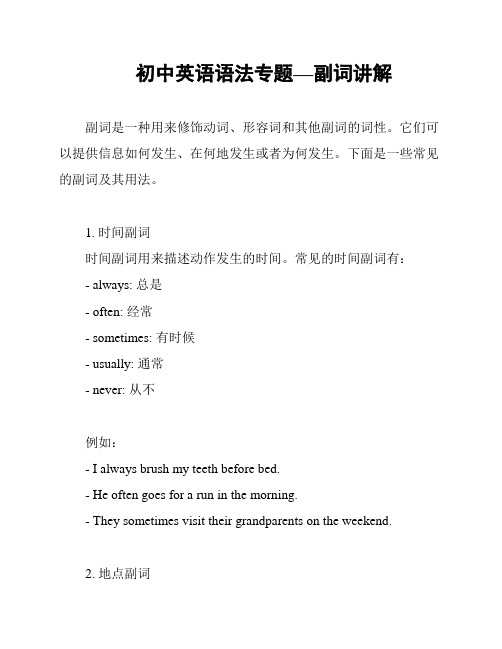
初中英语语法专题—副词讲解副词是一种用来修饰动词、形容词和其他副词的词性。
它们可以提供信息如何发生、在何地发生或者为何发生。
下面是一些常见的副词及其用法。
1. 时间副词时间副词用来描述动作发生的时间。
常见的时间副词有:- always: 总是- often: 经常- sometimes: 有时候- usually: 通常- never: 从不例如:- I always brush my teeth before bed.- He often goes for a run in the morning.- They sometimes visit their grandparents on the weekend.2. 地点副词地点副词用来描述动作发生的地点。
常见的地点副词有:- here: 这里- there: 那里- everywhere: 到处- nearby: 附近- far: 远离例如:- Put the book here.- I want to go there.- You can find flowers everywhere in the garden.3. 程度副词程度副词用来描述动作或形容词的程度。
常见的程度副词有:- very: 非常- extremely: 极其- quite: 相当- too: 太- slightly: 稍微例如:- The movie was very interesting.- She is extremely talented in singing.- The food is quite delicious.4. 方式副词方式副词用来描述动作发生的方式。
常见的方式副词有:- slowly: 慢慢地- quickly: 快速地- carefully: 小心地- loudly: 大声地- quietly: 静静地例如:- Walk slowly in the park.- She speaks quickly.- Drive carefully on the road.记住,副词可以帮助我们更生动地描述动作的具体细节,让我们的语言更加丰富多样。
(专题精选)初中英语语法知识—副词的分类汇编及解析
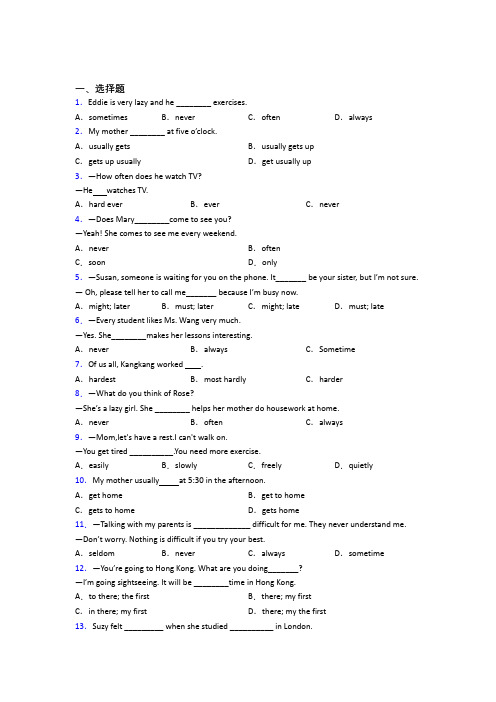
一、选择题1.Eddie is very lazy and he ________ exercises.A.sometimes B.never C.often D.always2.My mother ________ at five o’clock.A.usually gets B.usually gets upC.gets up usually D.get usually up3.—How often does he watch TV?—He watches TV.A.hard ever B.ever C.never4.—Does Mary________come to see you?—Yeah! She comes to see me every weekend.A.never B.oftenC.soon D.only5.—Susan, someone is waiting for you on the phone. It_______ be your sister, but I’m not sure.— Oh, please tell her to call me_______ because I’m busy now.A.might; later B.must; later C.might; late D.must; late 6.—Every student likes Ms. Wang very much.—Yes. She________makes her lessons interesting.A.never B.always C.Sometime7.Of us all, Kangkang worked .A.hardest B.most hardly C.harder8.—What do you think of Rose?—She’s a lazy girl. She ________ helps her mother do housework at home.A.never B.often C.always9.—Mom,let's have a rest.I can't walk on.—You get tired __________.You need more exercise.A.easily B.slowly C.freely D.quietly10.My mother usually at 5:30 in the afternoon.A.get home B.get to homeC.gets to home D.gets home11.—Talking with my parents is _____________ difficult for me. They never understand me.—Don’t worry. Nothing is difficult if you try your best.A.seldom B.never C.always D.sometime 12.—You’re going to Hong Kong. What are you doing_______?—I’m going sightseeing. It will be ________time in Hong Kong.A.to there; the first B.there; my firstC.in there; my first D.there; my the first13.Suzy felt _________ when she studied __________ in London.A.alone; lonely B.alone; aloneC.lonely; lonely D.lonely; alone14.--What do you think of the football match?--Wonderful! The Chinese football team has never played __________.A.worse B.worst C.better D.best 15.Little Tom draws __________. His pictures are very __________.A.good;well B.good;good C.well;good 16.People will have ________free time because robots will help us do ________. A.fewer; more B.more; more C.less; more 17.—Have you ever been to Brazil?— No, I have________ been there.A.often B.usually C.never18.—what's the matter with Eric?—He hurt himself ________playing soccer.A.clearly B.happily C.badly D.quietly 19.—Have you ever been to Disneyland?—No, ______. I hope I can go there next year.A.always B.sometimes C.never D.often 20.This kind of plant is seen in our city because it lives 4,500m above the sea level and is hard to find.A.often B.always C.usually D.seldom 21.The result is ________ worse than we thought!A.more B.even C.great D.much more22.— Tom, which subject do you like ______, math or English?— Math.A.well B.better C.best D.the best 23.We’re happy that our country has developed ______ these years than before. A.quickly B.less quickly C.more quickly D.most quickly 24.I didn’t do very well in this exam. Unluckily, he did it .A.badly B.worse C.better D.worst 25.Alan always gets up late and then goes to school, so he ______ eats breakfast. A.always B.usually C.never D.sometimes【参考答案】***试卷处理标记,请不要删除一、选择题1.B解析:B【解析】句意:Eddie非常懒,他从不锻炼。
初中副词的知识点总结大全
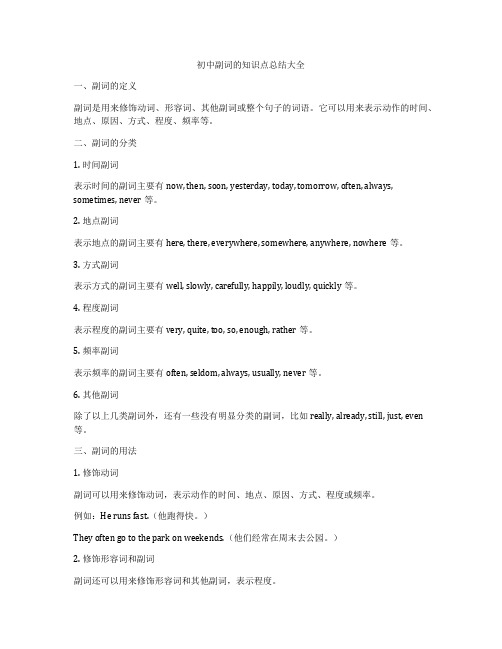
初中副词的知识点总结大全一、副词的定义副词是用来修饰动词、形容词、其他副词或整个句子的词语。
它可以用来表示动作的时间、地点、原因、方式、程度、频率等。
二、副词的分类1. 时间副词表示时间的副词主要有now, then, soon, yesterday, today, tomorrow, often, always, sometimes, never等。
2. 地点副词表示地点的副词主要有here, there, everywhere, somewhere, anywhere, nowhere等。
3. 方式副词表示方式的副词主要有well, slowly, carefully, happily, loudly, quickly等。
4. 程度副词表示程度的副词主要有very, quite, too, so, enough, rather等。
5. 频率副词表示频率的副词主要有often, seldom, always, usually, never等。
6. 其他副词除了以上几类副词外,还有一些没有明显分类的副词,比如really, already, still, just, even 等。
三、副词的用法1. 修饰动词副词可以用来修饰动词,表示动作的时间、地点、原因、方式、程度或频率。
例如:He runs fast.(他跑得快。
)They often go to the park on weekends.(他们经常在周末去公园。
)2. 修饰形容词和副词副词还可以用来修饰形容词和其他副词,表示程度。
例如:She is very beautiful.(她非常漂亮。
)3. 修饰整个句子副词还可以用来修饰整个句子,表示说话人的态度、角度或者整个句子的总体情况。
例如:Hopefully, everything will be fine.(希望一切顺利。
)四、副词的用法注意事项1. 位置副词一般放在被修饰的词语之后,但有时也会放在被修饰的词语之前。
新初中英语语法知识—副词的全集汇编附解析
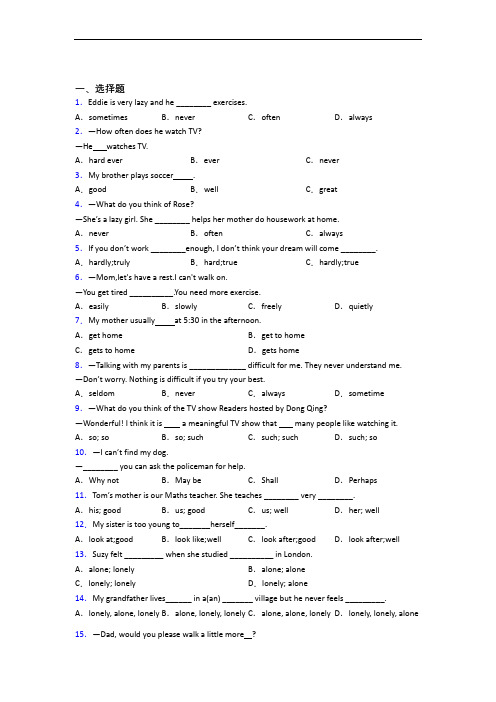
一、选择题1.Eddie is very lazy and he ________ exercises.A.sometimes B.never C.often D.always 2.—How often does he watch TV?—He watches TV.A.hard ever B.ever C.never3.My brother plays soccer .A.good B.well C.great4.—What do you think of Rose?—She’s a lazy girl. She ________ helps her mother do housework at home.A.never B.often C.always5.If you don’t work ________enough, I don’t think your dream will come ________. A.hardly;truly B.hard;true C.hardly;true 6.—Mom,let's have a rest.I can't walk on.—You get tired __________.You need more exercise.A.easily B.slowly C.freely D.quietly7.My mother usually at 5:30 in the afternoon.A.get home B.get to homeC.gets to home D.gets home8.—Talking with my parents is _____________ difficult for me. They never understand me.—Don’t worry. Nothing is difficult if you try your best.A.seldom B.never C.always D.sometime9.―What do you think of the TV show Readers hosted by Dong Qing?―Wonderful! I think it is a meaningful TV show that many people like watching it. A.so; so B.so; such C.such; such D.such; so10.—I can’t find my dog.—________ you can ask the policeman for help.A.Why not B.May be C.Shall D.Perhaps 11.Tom’s mother is our Maths teacher. She teaches ________ very ________.A.his; good B.us; good C.us; well D.her; well12.My sister is too young to_______herself_______.A.look at;good B.look like;well C.look after;good D.look after;well 13.Suzy felt _________ when she studied __________ in London.A.alone; lonely B.alone; aloneC.lonely; lonely D.lonely; alone14.My grandfather lives______ in a(an) _______ village but he never feels _________. A.lonely, alone, lonely B.alone, lonely, lonely C.alone, alone, lonely D.lonely, lonely, alone15.—Dad, would you please walk a little more ?—Sorry. I thought you could follow me.A.closely B.quickly C.quietly D.slowly 16.Little Tom draws __________. His pictures are very __________.A.good;well B.good;good C.well;good17.As we know, we should eat ________because a________ diet is good for our health. A.regular; regular B.regular; regularly C.regularly; regular 18.Practice makes perfect. You learn to play the piano by practicing. _______, you can’t really learn a language well without using it.A.Probably B.Hopefully C.Thankfully D.Similarly 19.—what's the matter with Eric?—He hurt himself ________playing soccer.A.clearly B.happily C.badly D.quietly 20.—Jack, how was your summer vacation?—Just so-so. I decided to go for my next vacation.A.something wonderful B.wonderful somethingC.somewhere wonderful D.wonderful somewhere21.Li Ming failed the final exam, so he decided to study _______ next term.A.hardly B.hard C.harder D.hardest 22.—Hi, Bob! I can’t find my story book. Have you seen it?—Sorry, I haven’t. Why not ask Jim? Perhaps he’s seen it _____.A.anywhere B.everywhere C.nowhere D.somewhere 23.--What do you think of the football match?--Wonderful! The Chinese football team has never played __________.A.worse B.worst C.better D.best 24.These days lots of people are working_________ to get_________ for their living. A.hard enough; enough money B.enough hardly; money enough C.enough hard; money enough D.hardly enough; enough money25.The old man lives ___________ , but he doesn't feel ________ .A.lonely; alone B.alone; lonely C.alone; alone D.lonely; lonely 【参考答案】***试卷处理标记,请不要删除一、选择题1.B解析:B【解析】句意:Eddie非常懒,他从不锻炼。
初中英语副词知识点归纳
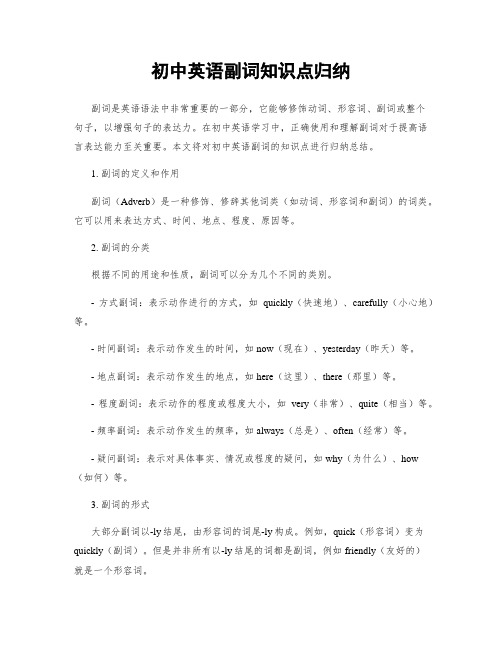
初中英语副词知识点归纳副词是英语语法中非常重要的一部分,它能够修饰动词、形容词、副词或整个句子,以增强句子的表达力。
在初中英语学习中,正确使用和理解副词对于提高语言表达能力至关重要。
本文将对初中英语副词的知识点进行归纳总结。
1. 副词的定义和作用副词(Adverb)是一种修饰、修辞其他词类(如动词、形容词和副词)的词类。
它可以用来表达方式、时间、地点、程度、原因等。
2. 副词的分类根据不同的用途和性质,副词可以分为几个不同的类别。
- 方式副词:表示动作进行的方式,如quickly(快速地)、carefully(小心地)等。
- 时间副词:表示动作发生的时间,如now(现在)、yesterday(昨天)等。
- 地点副词:表示动作发生的地点,如here(这里)、there(那里)等。
- 程度副词:表示动作的程度或程度大小,如very(非常)、quite(相当)等。
- 频率副词:表示动作发生的频率,如always(总是)、often(经常)等。
- 疑问副词:表示对具体事实、情况或程度的疑问,如why(为什么)、how (如何)等。
3. 副词的形式大部分副词以-ly结尾,由形容词的词尾-ly构成。
例如,quick(形容词)变为quickly(副词)。
但是并非所有以-ly结尾的词都是副词,例如friendly(友好的)就是一个形容词。
4. 副词的位置副词通常位于动词之后,形容词之前或者句子的末尾。
具体位置取决于不同的修饰对象和句子结构。
- 修饰动词:She runs quickly.(她跑得快。
)- 修饰形容词:He is very tall.(他很高。
)- 句子的末尾:She studied hard, therefore she passed the exam.(她学习刻苦,因此她通过了考试。
)5. 常见的副词下面列举一些常见的副词及其在句子中的具体用法。
- manner(方式):carefully(仔细地)、slowly(慢慢地)- time(时间):now(现在)、soon(不久)、yesterday(昨天)- place(地点):here(这里)、there(那里)- degree(程度):very(非常)、quite(相当)- frequency(频率):always(总是)、often(经常)- question(疑问):why(为什么)、how(如何)6. 副词与其他词类的不同副词与其他词类(如形容词和名词)在用法和意义上有所不同,需要注意以下几点。
新初中英语语法知识—副词的单元汇编含解析
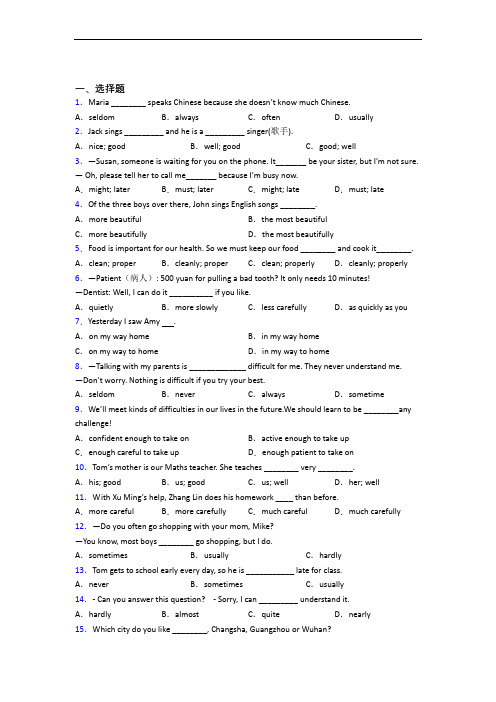
一、选择题1.Maria ________ speaks Chinese because she doesn’t know much Chinese.A.seldom B.always C.often D.usually2.Jack sings _________ and he is a _________ singer(歌手).A.nice; good B.well; good C.good; well 3.—Susan, someone is waiting for you on the p hone. It_______ be your sister, but I’m not sure.—Oh, please tell her to call me_______ because I’m busy now.A.might; later B.must; later C.might; late D.must; late4.Of the three boys over there, John sings English songs ________.A.more beautiful B.the most beautifulC.more beautifully D.the most beautifully5.Food is important for our health. So we must keep our food ________ and cook it________. A.clean; proper B.cleanly; proper C.clean; properly D.cleanly; properly 6.—Patient(病人): 500 yuan for pulling a bad tooth? It only needs 10 minutes!—Dentist: Well, I can do it __________ if you like.A.quietly B.more slowly C.less carefully D.as quickly as you 7.Yesterday I saw Amy .A.on my way home B.in my way homeC.on my way to home D.in my way to home8.—Talking with my parents is _____________ difficult for me. They never understand me.—Don’t worry. Nothing is difficult if you try your best.A.seldom B.never C.always D.sometime 9.We’ll meet kinds of difficulties in our lives in the future.We should learn to be ________any challenge!A.confident enough to take on B.active enough to take upC.enough careful to take up D.enough patient to take on10.Tom’s mother is our Maths teacher. She teaches ________ very ________.A.his; good B.us; good C.us; well D.her; well 11.With Xu Ming’s help, Zhang Lin does his homework ____ than before.A.more careful B.more carefully C.much careful D.much carefully 12.—Do you often go shopping with your mom, Mike?—You know, most boys ________ go shopping, but I do.A.sometimes B.usually C.hardly13.Tom gets to school early every day, so he is ___________ late for class.A.never B.sometimes C.usually14.- Can you answer this question? - Sorry, I can _________ understand it.A.hardly B.almost C.quite D.nearly 15.Which city do you like ________, Changsha, Guangzhou or Wuhan?A.best B.better C.more16.Practice makes perfect. You learn to play the piano by practicing. _______, you can’t really learn a language well without using it.A.Probably B.Hopefully C.Thankfully D.Similarly 17.—How often do you write to your cousin in Francisco?—________. I’m busy preparing for my exams these days.A.Seldom B.Often C.Always18.John is a kind boy. He __________ helps others when they are in trouble.A.never B.hardly C.always D.sometimes 19.Mr. Green is very strict with his children, and he ______ allows them to watch TV on school days.A.always B.usually C.sometimes D.never 20.We’re happy that our country has developed ______ these years than before. A.quickly B.less quickly C.more quickly D.most quickly 21.I didn’t do very well in this exam. Unluckily, he did it .A.badly B.worse C.better D.worst22.--What do you think of the football match?--Wonderful! The Chinese football team has never played __________.A.worse B.worst C.better D.best23.The children are making too much __________. How __________ they are playing! A.noise; noisily B.noise; noisy C.noisy; noisy D.noisy; noisily 24.These days lots of people are working_________ to get_________ for their living. A.hard enough; enough money B.enough hardly; money enough C.enough hard; money enough D.hardly enough; enough money25.Han Han’s books are_______ written and sell______.A.good ; good B.good ; well C.well; well D.well ; good【参考答案】***试卷处理标记,请不要删除一、选择题1.A解析:A【解析】【分析】【详解】句意:Maria很少说汉语,因为她不太懂中文。
初中英语副词的知识点总结
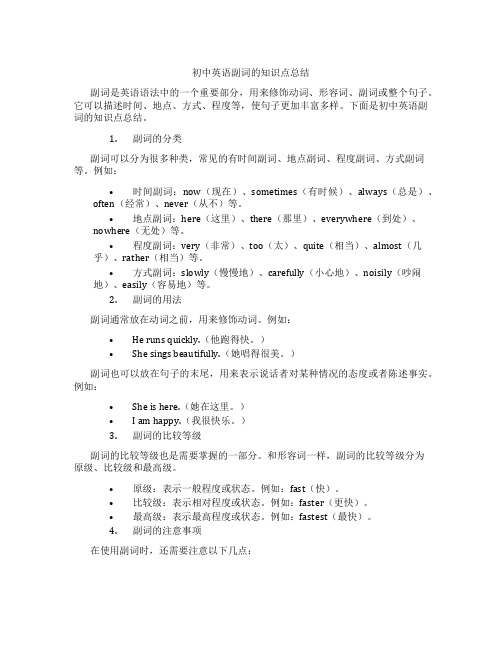
初中英语副词的知识点总结副词是英语语法中的一个重要部分,用来修饰动词、形容词、副词或整个句子。
它可以描述时间、地点、方式、程度等,使句子更加丰富多样。
下面是初中英语副词的知识点总结。
1.副词的分类副词可以分为很多种类,常见的有时间副词、地点副词、程度副词、方式副词等。
例如:•时间副词:now(现在)、sometimes(有时候)、always(总是)、often(经常)、never(从不)等。
•地点副词:here(这里)、there(那里)、everywhere(到处)、nowhere(无处)等。
•程度副词:very(非常)、too(太)、quite(相当)、almost(几乎)、rather(相当)等。
•方式副词:slowly(慢慢地)、carefully(小心地)、noisily(吵闹地)、easily(容易地)等。
2.副词的用法副词通常放在动词之前,用来修饰动词。
例如:•He runs quickly.(他跑得快。
)•She sings beautifully.(她唱得很美。
)副词也可以放在句子的末尾,用来表示说话者对某种情况的态度或者陈述事实。
例如:•She is here.(她在这里。
)•I am happy.(我很快乐。
)3.副词的比较等级副词的比较等级也是需要掌握的一部分。
和形容词一样,副词的比较等级分为原级、比较级和最高级。
•原级:表示一般程度或状态。
例如:fast(快)。
•比较级:表示相对程度或状态。
例如:faster(更快)。
•最高级:表示最高程度或状态。
例如:fastest(最快)。
4.副词的注意事项在使用副词时,还需要注意以下几点:•当副词修饰形容词或副词时,一般要在副词前面加上程度副词。
例如:very quickly(非常快)。
•副词的位置也需要注意。
一般情况下,副词放在动词之前,但有些副词可以放在句子的开头或末尾。
例如:She often goes to the park.(她经常去公园。
中考英语副词知识点总结
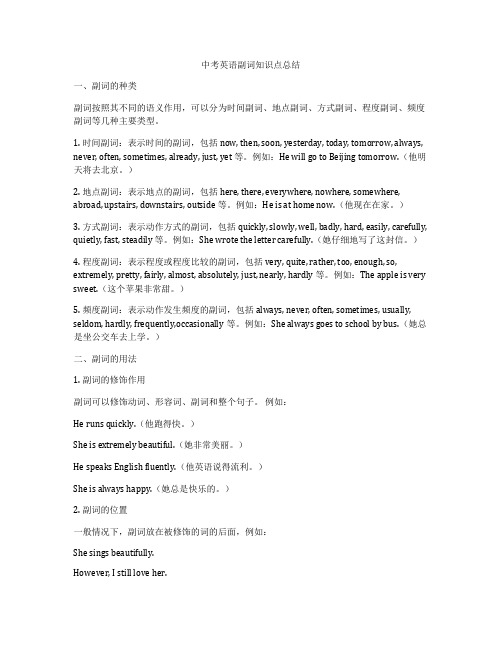
中考英语副词知识点总结一、副词的种类副词按照其不同的语义作用,可以分为时间副词、地点副词、方式副词、程度副词、频度副词等几种主要类型。
1. 时间副词:表示时间的副词,包括now, then, soon, yesterday, today, tomorrow, always, never, often, sometimes, already, just, yet 等。
例如:He will go to Beijing tomorrow.(他明天将去北京。
)2. 地点副词:表示地点的副词,包括here, there, everywhere, nowhere, somewhere, abroad, upstairs, downstairs, outside 等。
例如:He is at home now.(他现在在家。
)3. 方式副词:表示动作方式的副词,包括quickly, slowly, well, badly, hard, easily, carefully, quietly, fast, steadily 等。
例如:She wrote the letter carefully.(她仔细地写了这封信。
)4. 程度副词:表示程度或程度比较的副词,包括very, quite, rather, too, enough, so, extremely, pretty, fairly, almost, absolutely, just, nearly, hardly 等。
例如:The apple is very sweet.(这个苹果非常甜。
)5. 频度副词:表示动作发生频度的副词,包括always, never, often, sometimes, usually, seldom, hardly, frequently,occasionally等。
例如:She always goes to school by bus.(她总是坐公交车去上学。
初中英语知识点归纳常见的副词短语用法总结
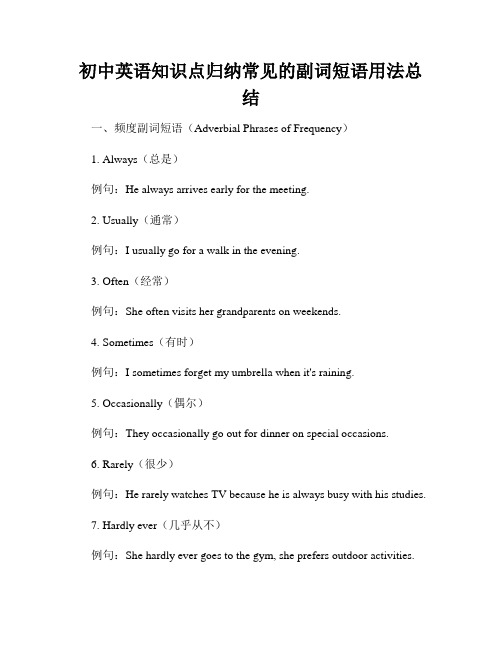
初中英语知识点归纳常见的副词短语用法总结一、频度副词短语(Adverbial Phrases of Frequency)1. Always(总是)例句:He always arrives early for the meeting.2. Usually(通常)例句:I usually go for a walk in the evening.3. Often(经常)例句:She often visits her grandparents on weekends.4. Sometimes(有时)例句:I sometimes forget my umbrella when it's raining.5. Occasionally(偶尔)例句:They occasionally go out for dinner on special occasions.6. Rarely(很少)例句:He rarely watches TV because he is always busy with his studies.7. Hardly ever(几乎从不)例句:She hardly ever goes to the gym, she prefers outdoor activities.8. Never(从不)例句:They never miss a chance to travel during summer vacation.二、时间副词短语(Adverbial Phrases of Time)1. In the morning/afternoon/evening(在早晨/下午/晚上)例句:I exercise in the morning before going to work.2. On weekdays/weekends(在工作日/周末)例句:I have to work on weekdays but I relax on weekends.3. At night(在晚上)例句:They like to stargaze at night in their backyard.4. By the end of(到...结束)例句:She will finish her project by the end of next week.5. In the meantime(与此同时)例句:While waiting for the bus, he read a book in the meantime.6. At the same time(同时)例句:They arrived at the party at the same time.7. From time to time(时常)例句:He visits his grandparents from time to time.8. All day/night long(整天/整晚)例句:They were dancing all night long at the party.三、地点副词短语(Adverbial Phrases of Place)1. In the park(在公园)例句:They often have picnics in the park on weekends.2. At school(在学校)例句:I met my friends at school during lunch break.3. On the beach(在海滩)例句:They love swimming and sunbathing on the beach.4. In the city/countryside(在城市/农村)例句:She enjoys the tranquility of living in the countryside.5. At home(在家)例句:He spends most of his weekends at home with his family. 6. On the way(在路上)例句:They had a great conversation on the way to the airport. 7. Across the road(在马路对面)例句:The supermarket is just across the road, it's very convenient.四、方式副词短语(Adverbial Phrases of Manner)1. In a hurry(匆忙地)例句:She left the house in a hurry because she was late for work.2. With pleasure(乐意地)例句:I will help you move next week, with pleasure.3. In a loud voice(大声地)例句:He shouted in a loud voice to get the attention of the audience.4. On purpose(故意地)例句:He spilled the drink on purpose to annoy his sister.5. By accident(偶然地)例句:I found this lost wallet by accident while walking in the park.6. In a funny way(滑稽地)例句:He imitates his teacher in a funny way and makes everyone laugh.7. In a serious manner(严肃地)例句:The teacher spoke to the students in a serious manner about their behavior.总结:副词短语在英语中起到修饰动词、形容词、副词和整个句子的作用,能够更准确地表达出时间、地点、方式和频率等信息。
《中考英语》初中英语语法知识—副词的知识点总复习附解析
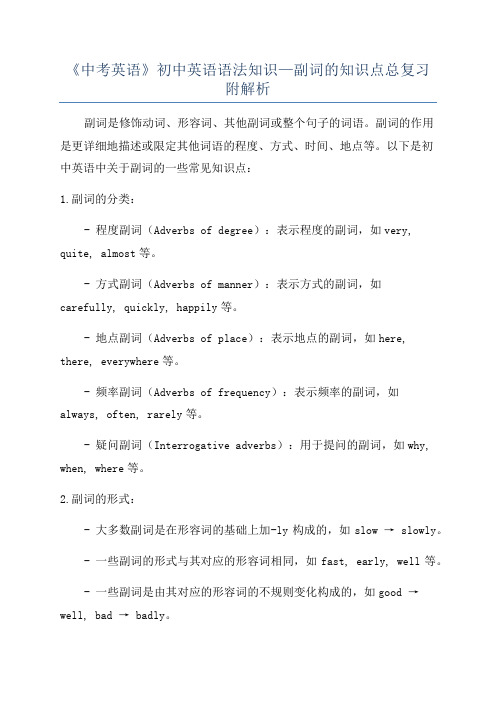
《中考英语》初中英语语法知识—副词的知识点总复习附解析副词是修饰动词、形容词、其他副词或整个句子的词语。
副词的作用是更详细地描述或限定其他词语的程度、方式、时间、地点等。
以下是初中英语中关于副词的一些常见知识点:1.副词的分类:- 程度副词(Adverbs of degree):表示程度的副词,如very, quite, almost等。
- 方式副词(Adverbs of manner):表示方式的副词,如carefully, quickly, happily等。
- 地点副词(Adverbs of place):表示地点的副词,如here, there, everywhere等。
- 频率副词(Adverbs of frequency):表示频率的副词,如always, often, rarely等。
- 疑问副词(Interrogative adverbs):用于提问的副词,如why, when, where等。
2.副词的形式:- 大多数副词是在形容词的基础上加-ly构成的,如slow → slowly。
- 一些副词的形式与其对应的形容词相同,如fast, early, well等。
- 一些副词是由其对应的形容词的不规则变化构成的,如good → well, bad → badly。
3.副词的位置:- 一般情况下,副词位于动词或形容词之后,如He runs quickly.- 当句子中有助动词时,副词位于助动词之后,如He can easily solve the problem.- 当句子中既有助动词又有情态动词时,副词位于情态动词之后,如He will definitely pass the test.解析:1.副词的分类可以帮助我们更好地理解副词的不同用法和含义。
2. 注意一些特殊的副词形式,特别是那些不是通过在形容词后加-ly 构成的副词。
3.熟悉副词的常见位置,以免在句子中使用错误。
4. 注意副词的用法,例如在修饰比较级或最高级形容词时的特殊用法,如more quickly, most easily.。
八年级常用的副词知识点

八年级常用的副词知识点副词是我们日常生活和学习中经常使用的一种词类,它可以修饰动词、形容词、副词,表示时间、地点、程度、方式等语法意义。
在英语中,副词属于比较难掌握的语法知识点之一,因此在八年级英语学习中也是一个重要的内容。
下面就跟随本文,了解一下八年级常用的副词知识点吧!一、修饰动词的副词1. 时间副词时间副词主要用来表示动作发生的时间或频率,如:always(总是)、often(经常)、usually(通常)、sometimes(有时)、rarely(很少)、never(从不)等。
例如:He always studies hard.(他总是努力学习。
)She never misses a class.(她从不缺课。
)2. 地点副词地点副词主要用来表示动作发生的位置或方向,如:here(这里)、there(那里)、up(向上)、down(向下)、in(在里面)、out(在外面)等。
例如:He put the book down on the table.(他把书放在桌子上。
)She walked into the room.(她走进了房间。
)3. 程度副词程度副词主要用来表示动作的强度或程度,如:very(非常)、quite(相当)、too(过于)、enough(足够)、almost(几乎)等。
例如:She is very good at singing.(她唱歌非常好。
)He is almost as tall as his father.(他和他的父亲差不多一样高。
)二、修饰形容词的副词1. 程度副词前面已经提到了,程度副词可以不仅可以修饰动词,还可以修饰形容词。
用来表示形容词的程度,如:very(非常)、quite(相当)、too(过于)、pretty(相当)等。
例如:She is very beautiful.(她很漂亮。
)He is pretty smart.(他相当聪明。
)2. 形容词副词形容词副词是一种特殊的副词,它是由形容词加“-ly”构成,其作用和副词相似,例如:slowly(慢慢地)、quickly(快速地)、happily(开心地)、sadly(悲伤地)等。
(完整版)人教版初中英语各单元副词知识点汇总表
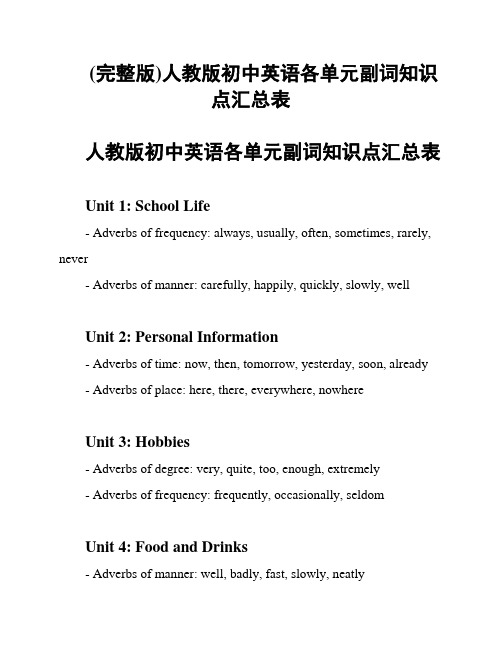
(完整版)人教版初中英语各单元副词知识点汇总表人教版初中英语各单元副词知识点汇总表Unit 1: School Life- Adverbs of frequency: always, usually, often, sometimes, rarely, never- Adverbs of manner: carefully, happily, quickly, slowly, wellUnit 2: Personal Information- Adverbs of time: now, then, tomorrow, yesterday, soon, already - Adverbs of place: here, there, everywhere, nowhereUnit 3: Hobbies- Adverbs of degree: very, quite, too, enough, extremely- Adverbs of frequency: frequently, occasionally, seldomUnit 4: Food and Drinks- Adverbs of manner: well, badly, fast, slowly, neatly- Adverbs of place: at, in, on, up, downUnit 5: Daily Routine- Adverbs of frequency: always, often, sometimes, rarely, never - Adverbs of time: now, then, today, yesterday, soon, alreadyUnit 6: Travel and Transportation- Adverbs of frequency: usually, occasionally, seldom, never - Adverbs of manner: nicely, safely, easilyUnit 7: Festivals and Celebrations- Adverbs of time: soon, then, now, before, after, tonight- Adverbs of place: here, there, somewhere, anywhereUnit 8: Technology- Adverbs of manner: well, carefully, quickly, slowly- Adverbs of frequency: often, occasionally, seldom, neverUnit 9: Jobs and Careers- Adverbs of time: now, then, soon, already, today, tomorrow- Adverbs of degree: very, quite, extremely, enoughUnit 10: Environment- Adverbs of manner: properly, effectively, responsibly- Adverbs of frequency: always, often, sometimes, seldom, neverUnit 11: Health and Fitness- Adverbs of manner: well, badly, fast, slowly, easily- Adverbs of time: now, then, soon, already, yesterdayUnit 12: Emotions- Adverbs of degree: very, extremely, quite, enough- Adverbs of frequency: always, usually, rarely, neverUnit 13: Shopping- Adverbs of manner: well, carefully, quickly, slowly, easily- Adverbs of place: here, there, everywhere, somewhereUnit 14: Nature- Adverbs of time: now, then, yesterday, soon, already- Adverbs of degree: very, quite, extremely, enoughUnit 15: Science and Technology- Adverbs of manner: carefully, quickly, slowly, well- Adverbs of frequency: often, sometimes, rarely, never以上是关于人教版初中英语各单元副词知识点汇总表的内容,希望对你有所帮助!。
初中副词知识点总结
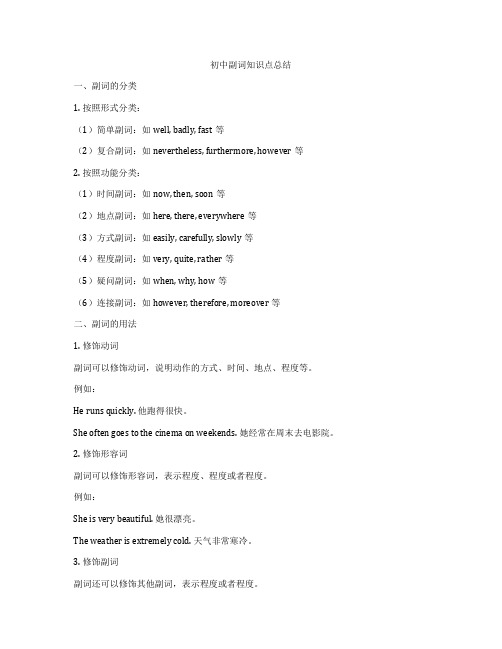
初中副词知识点总结一、副词的分类1. 按照形式分类:(1)简单副词:如well, badly, fast等(2)复合副词:如nevertheless, furthermore, however等2. 按照功能分类:(1)时间副词:如now, then, soon等(2)地点副词:如here, there, everywhere等(3)方式副词:如easily, carefully, slowly等(4)程度副词:如very, quite, rather等(5)疑问副词:如when, why, how等(6)连接副词:如however, therefore, moreover等二、副词的用法1. 修饰动词副词可以修饰动词,说明动作的方式、时间、地点、程度等。
例如:He runs quickly. 他跑得很快。
She often goes to the cinema on weekends. 她经常在周末去电影院。
2. 修饰形容词副词可以修饰形容词,表示程度、程度或者程度。
例如:She is very beautiful. 她很漂亮。
The weather is extremely cold. 天气非常寒冷。
3. 修饰副词副词还可以修饰其他副词,表示程度或者程度。
例如:She sings quite beautifully. 她唱得相当漂亮。
I am almost never late. 我几乎从不迟到。
4. 修饰整个句子副词还可以修饰整个句子,表示说话者的态度、观点或行动。
例如:Certainly, I will help you. 当然,我会帮助你。
Unfortunately, it rained on the day of the picnic. 不幸的是,野餐那天下雨了。
5. 位置副词一般放在被修饰的词语之后,若要修饰整个句子则通常放在句首或句尾。
例如:She speaks English fluently. 她英语说得流利。
初中英语语法知识—副词的单元汇编含解析

一、选择题1.— Is your home close to the school, Tom?— No, it's a long way, but I am________ late for school because I get up early daily. A.always B.usually C.never D.sometimes 2.Harry________ eats vegetables, although it’s good for his health.A.hardly ever B.usually C.always3.—Do you often go shopping with your mom, Mike?—You know, most boys ________ go shopping, but I do.A.sometimes B.usually C.hardly4.My mother ________ at five o’clock.A.usually gets B.usually gets upC.gets up usually D.get usually up5.—Does Mary________come to see you?—Yeah! She comes to see me every weekend.A.never B.oftenC.soon D.only6.—Sarah always asks “Where’s my mother?”.—After all (毕竟), she is _______ three years old. She needs mother.A.then B.always C.only7.Being _______, the novel based upon real-life events sells ________.A.very worth being read; good B.well worth reading; goodC.well worth reading; well D.very worth reading; well8.Helen was so excited at the news that she could ________ say a word.A.ever B.almost C.hardly9.—Patient(病人): 500 yuan for pulling a bad tooth? It only needs 10 minutes!—Dentist: Well, I can do it __________ if you like.A.quietly B.more slowly C.less carefully D.as quickly as you 10.—I can’t find my dog.—________ you can ask the policeman for help.A.Why not B.May be C.Shall D.Perhaps 11.Tom’s mother is our Maths teacher. She teaches ________ very ________.A.his; good B.us; good C.us; well D.her; well 12.—Our volleyball team achieved great success in the match again.—Wow ! Few could play ______, I think.A.better B.well C.worse D.badly 13.Tom gets to school early every day, so he is ___________ late for class.A.never B.sometimes C.usually14.—Kitty is very good at musical instruments.—Yes, she is. She can play the guitar almost her guitar teacher.A.as better as B.as good as C.as well as D.so well as 15.Amy makes fewer mistakes than Frank. She does her homework .A.more careless B.more carelessly C.more careful D.more carefully 16.Which city do you like ________, Changsha, Guangzhou or Wuhan?A.best B.better C.more17.—Have you ever been to Brazil?— No, I have________ been there.A.often B.usually C.never18.— Tom, which subject do you like ______, math or English?— Math.A.well B.better C.best D.the best 19.We’re happy that our country has developed ______ these years than before.A.quickly B.less quickly C.more quickly D.most quickly 20.—Why do you think Sam did _______ than anyone else in the competition?—Because he sang most loudly and _______.A.worse; carefully B.better; clearlyC.worse; quietly D.best; carefully21.This kind of plant is seen in our city because it lives 4,500m above sea level and is hard to find.A.commonly B.always C.seldom D.easily 22.(2017湖北省鄂州市中考)—I’ll be away for a long time.—Don’t worry. She can look after your pet ________.A.careful enough B.enough carefulC.carefully enough D.enough carefully23.These days lots of people are working_________ to get_________ for their living. A.hard enough; enough money B.enough hardly; money enough C.enough hard; money enough D.hardly enough; enough money24.My grandfather lives______ in a(an) _______ village but he never feels _________. A.lonely, alone, lonely B.alone, lonely, lonely C.alone, alone, lonely D.lonely, lonely, alone 25.-How careful Jim is! - He writes ____ in our class.A.more careful B.most carefully C.most careful D.more carefully 【参考答案】***试卷处理标记,请不要删除一、选择题1.C【解析】【分析】【详解】句意:——汤姆,你家离学校近吗?——不,那是一段很长的路程,但是我从来没有迟到过,因为我每天都起得很早。
2021年初中英语语法知识—副词的单元汇编附解析
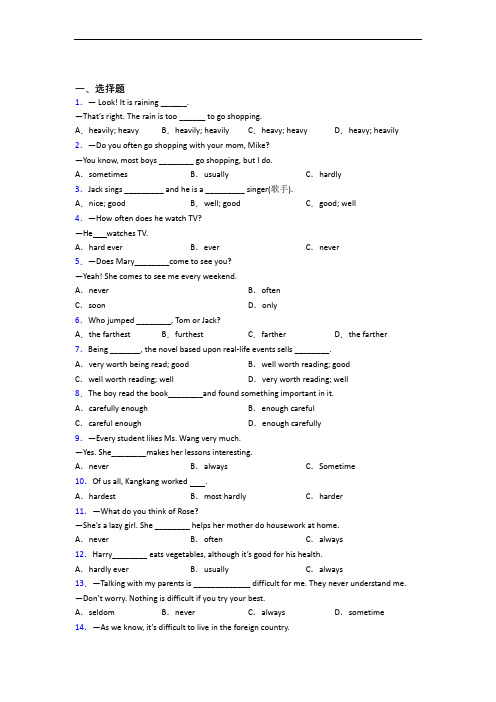
一、选择题1.— Look! It is raining ______.—That’s right. The rain is too ______ to go shopping.A.heavily; heavy B.heavily; heavily C.heavy; heavy D.heavy; heavily 2.—Do you often go shopping with your mom, Mike?—You know, most boys ________ go shopping, but I do.A.sometimes B.usually C.hardly3.Jack sings _________ and he is a _________ singer(歌手).A.nice; good B.well; good C.good; well4.—How often does he watch TV?—He watches TV.A.hard ever B.ever C.never5.—Does Mary________come to see you?—Yeah! She comes to see me every weekend.A.never B.oftenC.soon D.only6.Who jumped ________, Tom or Jack?A.the farthest B.furthest C.farther D.the farther 7.Being _______, the novel based upon real-life events sells ________.A.very worth being read; good B.well worth reading; goodC.well worth reading; well D.very worth reading; well8.The boy read the book________and found something important in it.A.carefully enough B.enough carefulC.careful enough D.enough carefully9.—Every student likes Ms. Wang very much.—Yes. She________makes her lessons interesting.A.never B.always C.Sometime10.Of us all, Kangkang worked .A.hardest B.most hardly C.harder11.—What do you think of Rose?—She’s a lazy girl. She ________ helps her mother do housework at ho me.A.never B.often C.always12.Harry________ eats vegetables, although it’s good for his health.A.hardly ever B.usually C.always 13.—Talking with my parents is _____________ difficult for me. They never understand me.—Don’t worry. Nothing is difficult i f you try your best.A.seldom B.never C.always D.sometime 14.—As we know, it’s difficult to live in the foreign country.—______ if you don’t understand the local language.A.Generally B.Naturally C.Exactly D.Especially 15.—I can’t find my dog.—________ you can ask the policeman for help.A.Why not B.May be C.Shall D.Perhaps 16.We’ll meet kinds of difficulties in our lives in the future.We should learn to be ________any challenge!A.confident enough to take on B.active enough to take upC.enough careful to take up D.enough patient to take on17.Eddie is very lazy and he ________ exercises.A.sometimes B.never C.often D.always 18.Little Tom draws __________. His pictures are very __________.A.good;well B.good;good C.well;good19.The poor woman lives _________.But she never feels ________.A.alone; lonely B.lonely; lonely C.alone; alone D.lonely; alone 20.My uncle doesn’t like fast food, so he _____eats it..A.always B.oftenC.sometimes D.seldom21.—Have you ever been to Brazil?— No, I have________ been there.A.often B.usually C.never22.—How often do you write to your cousin in Francisco?—________. I’m busy preparing for my exams these days.A.Seldom B.Often C.Always23.--What do you think of the football match?--Wonderful! The Chinese football team has never played __________.A.worse B.worst C.better D.best24.These days lots of people are working_________ to get_________ for their living. A.hard enough; enough money B.enough hardly; money enough C.enough hard; money enough D.hardly enough; enough money25.Look after yourself and take care of your pet.A.well; well B.good; good C.well; good D.good; well【参考答案】***试卷处理标记,请不要删除一、选择题1.A【解析】【分析】【详解】句意:——看!雨下得很大。
副词的知识点总结
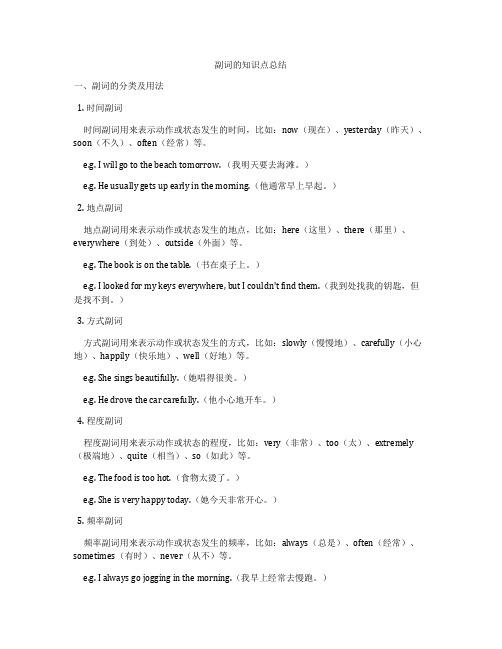
副词的知识点总结一、副词的分类及用法1. 时间副词时间副词用来表示动作或状态发生的时间,比如:now(现在)、yesterday(昨天)、soon(不久)、often(经常)等。
e.g. I will go to the beach tomorrow. (我明天要去海滩。
)e.g. He usually gets up early in the morning.(他通常早上早起。
)2. 地点副词地点副词用来表示动作或状态发生的地点,比如:here(这里)、there(那里)、everywhere(到处)、outside(外面)等。
e.g. The book is on the table.(书在桌子上。
)e.g. I looked for my keys everywhere, but I couldn't find them.(我到处找我的钥匙,但是找不到。
)3. 方式副词方式副词用来表示动作或状态发生的方式,比如:slowly(慢慢地)、carefully(小心地)、happily(快乐地)、well(好地)等。
e.g. She sings beautifully.(她唱得很美。
)e.g. He drove the car carefully.(他小心地开车。
)4. 程度副词程度副词用来表示动作或状态的程度,比如:very(非常)、too(太)、extremely (极端地)、quite(相当)、so(如此)等。
e.g. The food is too hot.(食物太烫了。
)e.g. She is very happy today.(她今天非常开心。
)5. 频率副词频率副词用来表示动作或状态发生的频率,比如:always(总是)、often(经常)、sometimes(有时)、never(从不)等。
e.g. I always go jogging in the morning.(我早上经常去慢跑。
初中英语语法知识—副词的分类汇编含解析(3)

一、选择题1.Maria ________ speaks Chinese because she doesn’t know much Chinese.A.seldom B.always C.often D.usually 2.Harry________ eats vegetables, although it’s good for his health.A.hardly ever B.usually C.always3.—You’re going to Hong Kong. What are y ou doing_______?—I’m going sightseeing. It will be ________time in Hong Kong.A.to there; the first B.there; my firstC.in there; my first D.there; my the first4.Helen was so excited at the news that she could ________ say a word.A.ever B.almost C.hardly5.Yesterday I saw Amy .A.on my way home B.in my way homeC.on my way to home D.in my way to home6.“The new technology is so ________ used in the world!” said Mr. White surprisedly with his eyes wide open.A.wide B.widely C.heavy D.heavily7.-How careful Jim is! - He writes ____ in our class.A.more careful B.most carefully C.most careful D.more carefully 8.Millie is good at singing .She sings________the famous singer CoCo.A.as good as B.as the best as C.as well as D.as better as 9.Eddie is very lazy and he ________ exercises.A.sometimes B.never C.often D.always 10.—Dad, would you please walk a little more ?—Sorry. I thought you could follow me.A.closely B.quickly C.quietly D.slowly 11.Tom gets to school early every day, so he is ___________ late for class.A.never B.sometimes C.usually12.—Our volleyball team achieved great success in the match again.—Wow ! Few could play ______, I think.A.better B.well C.worse D.badly 13.—Why did you buy one more tie?you have got more than ten ties.—A man can never have _____ many ties.A.enough B.too C.so D.such 14.—How was your trip to the British Museum?—I spoke no English and was _______ silent during the visit.A.completely B.peacefully C.patiently D.carefully15.Amy makes fewer mistakes than Frank. She does her homework .A.more careless B.more carelessly C.more careful D.more carefully 16.People will have ________free time because robots will help us do ________. A.fewer; more B.more; more C.less; more17.—Paul is very fat.—Yes, he________plays sports and he eats too much.A.always B.never C.usually18.—Have you ever been to Disneyland?—No, ______. I hope I can go there next year.A.always B.sometimes C.never D.often 19.—Jack, how was your summer vacation?—Just so-so. I decided to go for my next vacation.A.something wonderful B.wonderful somethingC.somewhere wonderful D.wonderful somewhere20.Li Ming failed the final exam, so he decided to study _______ next term.A.hardly B.hard C.harder D.hardest 21.Mr. Green is very strict with his children, and he ______ allows them to watch TV on school days.A.always B.usually C.sometimes D.never 22.We’re happy that our country has developed ______ these years than before. A.quickly B.less quickly C.more quickly D.most quickly 23.—Why do you think Sam did _______ than anyone else in the competition?—Because he sang most loudly and _______.A.worse; carefully B.better; clearlyC.worse; quietly D.best; carefully24.The children are making too much __________. How __________ they are playing! A.noise; noisily B.noise; noisy C.noisy; noisy D.noisy; noisily 25.The poor woman lives _________.But she never feels ________.A.alone; lonely B.lonely; lonely C.alone; alone D.lonely; alone【参考答案】***试卷处理标记,请不要删除一、选择题1.A解析:A【解析】【分析】句意:Maria很少说汉语,因为她不太懂中文。
八年级下册英语副词语法知识点归纳总结
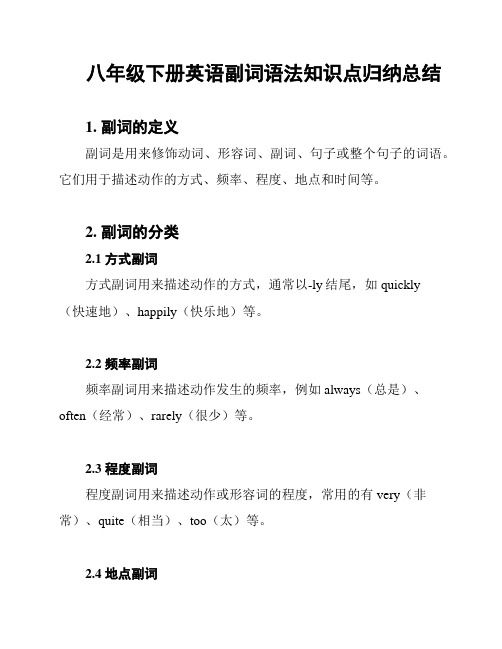
八年级下册英语副词语法知识点归纳总结1. 副词的定义副词是用来修饰动词、形容词、副词、句子或整个句子的词语。
它们用于描述动作的方式、频率、程度、地点和时间等。
2. 副词的分类2.1 方式副词方式副词用来描述动作的方式,通常以-ly结尾,如quickly(快速地)、happily(快乐地)等。
2.2 频率副词频率副词用来描述动作发生的频率,例如always(总是)、often(经常)、rarely(很少)等。
2.3 程度副词程度副词用来描述动作或形容词的程度,常用的有very(非常)、quite(相当)、too(太)等。
2.4 地点副词地点副词用来表示动作发生的地点,例如here(这里)、there (那里)、everywhere(到处)等。
2.5 时间副词时间副词用来表示动作发生的时间,如now(现在)、then (那时)、soon(很快)等。
3. 副词的用法3.1 修饰动词副词可用于修饰动词,描述动作的方式、频率或程度。
例如:- She speaks English fluently.(她说英语流利地。
)- They often go hiking on weekends.(他们经常在周末去徒步旅行。
)3.2 修饰形容词副词可以修饰形容词,表示程度或评价。
例如:- He is very tall.(他很高。
)- It's quite hot today.(今天很热。
)3.3 修饰副词副词也可以修饰其他副词,表示程度或频率的变化。
例如:- She runs very quickly.(她跑得非常快。
)- He rarely goes out at night.(他很少在晚上出去。
)3.4 修饰句子或整个句子副词还可以修饰整个句子或表达说话人的态度或观点。
例如:- Luckily, I found my keys.(幸运地,我找到了我的钥匙。
)- Frankly speaking, I don't agree with you.(坦率地说,我不同意你的观点。
- 1、下载文档前请自行甄别文档内容的完整性,平台不提供额外的编辑、内容补充、找答案等附加服务。
- 2、"仅部分预览"的文档,不可在线预览部分如存在完整性等问题,可反馈申请退款(可完整预览的文档不适用该条件!)。
- 3、如文档侵犯您的权益,请联系客服反馈,我们会尽快为您处理(人工客服工作时间:9:00-18:30)。
一、选择题1.Eddie is very lazy and he ________ exercises.A.sometimes B.never C.often D.always2.Tony ________ gets up early, so he is never late ________school.A.never; for B.never; toC.always; for D.always; to3.—Sarah always asks “Where’s my mother?”.—After all (毕竟), she is _______ three years old. She needs mother.A.then B.always C.only4.Food is important for our health. So we must keep our food ________ and cook it________. A.clean; proper B.cleanly; proper C.clean; properly D.cleanly; properly 5.My grandpa stays________in a (an) ________house, but he doesn't feel________. A.alone; alone; lonely B.lonely; lonely; aloneC.alone; lonely; alone D.alone; lonely; lonely6.—Patient(病人): 500 yuan for pulling a bad tooth? It only needs 10 minutes!—Dentist: Well, I can do it __________ if you like.A.quietly B.more slowly C.less carefully D.as quickly as you 7.Yesterday I saw Amy .A.on my way home B.in my way homeC.on my way to home D.in my way to home8.—Mom,let's have a rest.I can't walk on.—You get tired __________.You need more exercise.A.easily B.slowly C.freely D.quietly9.— Look! It is raining ______.—That’s right. The rain is too ______ to go shopping.A.heavily; heavy B.heavily; heavily C.heavy; heavy D.heavy; heavily 10.—I can’t find my dog.—________ you can ask the policeman for help.A.Why not B.May be C.Shall D.Perhaps11.-How careful Jim is! - He writes ____ in our class.A.more careful B.most carefully C.most careful D.more carefully 12.Harry________ eats vegetables, although it’s good for his health.A.hardly ever B.usually C.always13.Suzy felt _________ when she studied __________ in London.A.alone; lonely B.alone; aloneC.lonely; lonely D.lonely; alone14.—As we know, it’s difficult to live in the foreign country.—______ if yo u don’t understand the local language.A.Generally B.Naturally C.Exactly D.Especially 15.The poor woman lives _________.But she never feels ________.A.alone; lonely B.lonely; lonely C.alone; alone D.lonely; alone 16.My uncle doesn’t like fast food, so he _____eats it..A.always B.oftenC.sometimes D.seldom17.—Remember, ________ you do your homework, ________ mistakes you will make. —OK, Mom.A.the more careful; the less B.the more carefully; the less C.the more carefully; the fewer18.Maria ________ spea ks Chinese because she doesn’t know much Chinese. A.seldom B.always C.often D.usually 19.John is a kind boy. He __________ helps others when they are in trouble.A.never B.hardly C.always D.sometimes 20.—Have you ever been to Disneyland?—No, ______. I hope I can go there next year.A.always B.sometimes C.never D.often 21.—Hi, Bob! I can’t find my story book. Have you seen it?—Sorry, I haven’t. Why not ask Jim? Perhaps he’s seen it _____.A.anywhere B.everywhere C.nowhere D.somewhere 22.We’re happy that ou r country has developed ______ these years than before. A.quickly B.less quickly C.more quickly D.most quickly 23.(2017湖北省鄂州市中考)—I’ll be away for a long time.—Don’t worry. She can look after your pet ________.A.careful enough B.enough carefulC.carefully enough D.enough carefully24.--What do you think of the football match?--Wonderful! The Chinese football team has never played __________.A.worse B.worst C.better D.best 25.Millie is good at singing .She sings________the famous singer CoCo.A.as good as B.as the best as C.as well as D.as better as 【参考答案】***试卷处理标记,请不要删除一、选择题1.B解析:B【解析】句意:Eddie非常懒,他从不锻炼。
sometimes有时;never从不;often经常;always总是。
根据Eddie is very lazy可知他非常懒,因此从不锻炼,故选B。
2.C解析:C【解析】【详解】句意:托尼总是很早起床,所以他从不上学迟到。
考查频度副词和介词辨析。
never从不;always总是;for为了;to朝,向。
根据第二空前的late可知,这里应该用形容词短语be late for表示“迟到”,第二空填for;根据“所以他从不上学迟到”可推测,托尼应该是起床很早才不迟到,所以前半句是肯定句,第一空填always。
故选C。
3.C解析:C【解析】【分析】【详解】句意:——莎拉总是问:“我妈妈在哪里?”——毕竟,她只有三岁。
她需要母亲。
考查副词,A. then adv. 当时,然后;B. always一直,总是;C. only adv. 唯一地,仅有地,结合句意,这里应该是表示“仅仅三岁”,故选C。
4.C解析:C【解析】【分析】【详解】句意:食物对我们的健康很重要。
所以我们必须保持我们的食物干净并正确地烹饪。
考查形容词和副词辨析。
clean干净的,cleanly整洁地;proper正确的,properly正确地。
“keep sth. +形容词”表示“让某物保持某种状态”,固定结构,前空需用形容词;cook(烹饪)是动词,后空需用副词修饰。
根据句意结构,可知选C。
5.D解析:D【解析】【分析】【详解】句意:我爷爷独自一人住在一所偏僻的房子里,但他并不感到孤独。
考查形容词及副词。
alone客观上没别人和你在一起,单独的,独自地;lonely偏僻的,主观上感觉孤独的。
动词“stays”后用副词alone表示“独自一人住”;house前用形容词lonely 做定语修饰,表示“偏僻的房子”;feel为系动词,接形容词lonely作表语,表示“感到孤独的”。
故选D。
6.B解析:B【解析】【分析】【详解】句意:——病人:拔一颗坏牙500元?仅仅需要10分钟。
——医生:恩,如果你喜欢,我可以做得更慢。
考查副词比较级。
quietly安静地;more slowly更慢地; less carefully不认真地。
as quickly as you和你一样快。
根据上文“It only needs 10 minutes!”可知下文是医生说“我可以做得更慢”,此处用“more slowly”更慢地。
根据题意,故选B。
7.A解析:A【解析】【分析】【详解】句意:昨天我在回家的路上看到了艾米。
